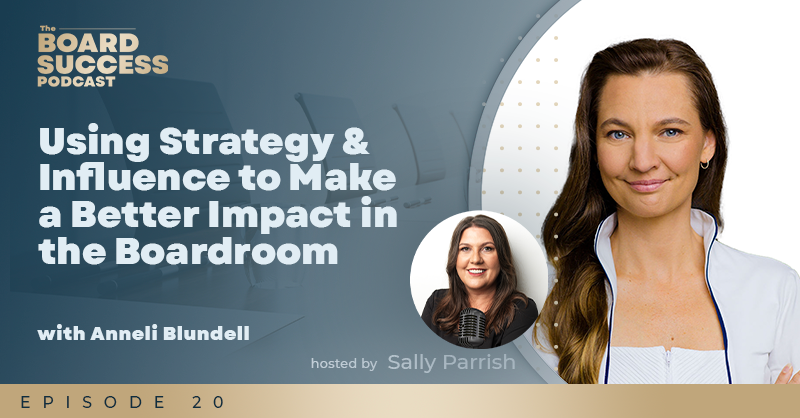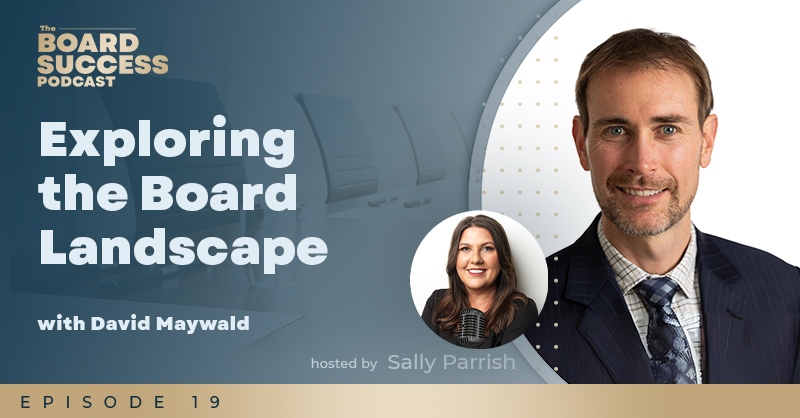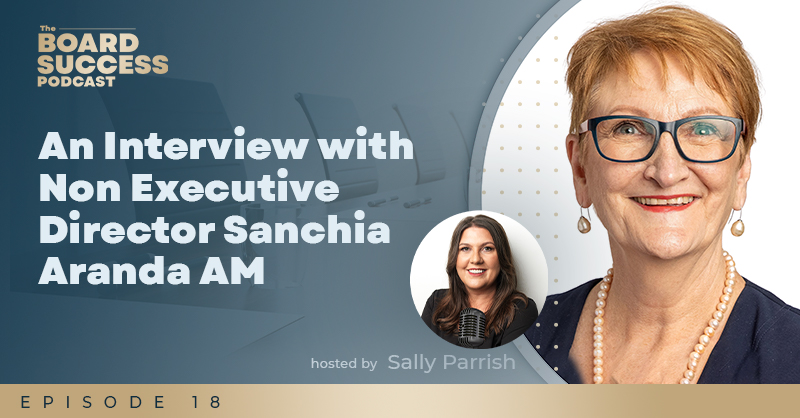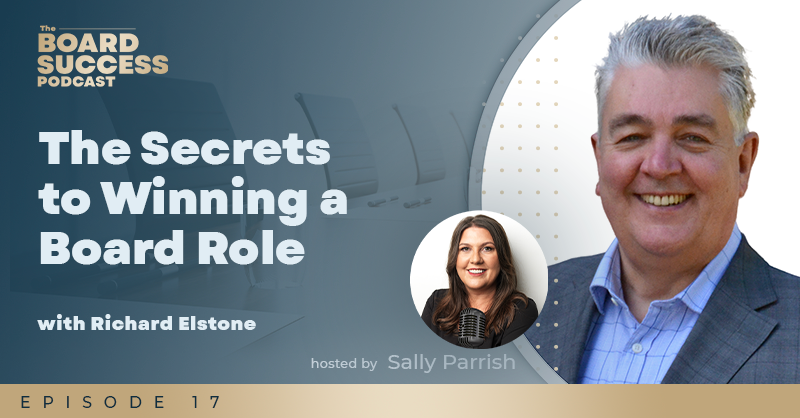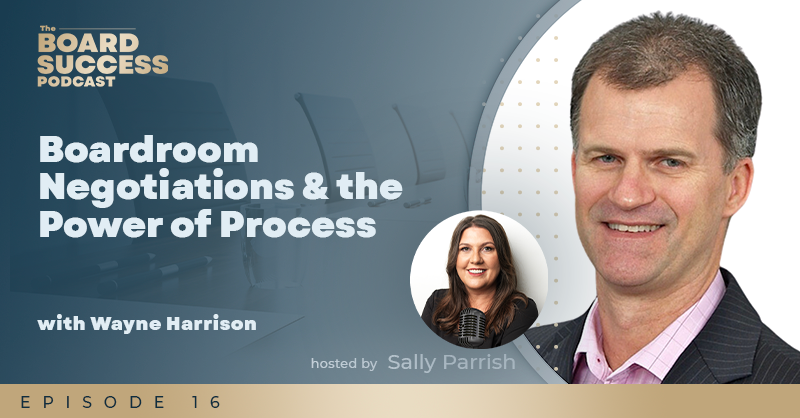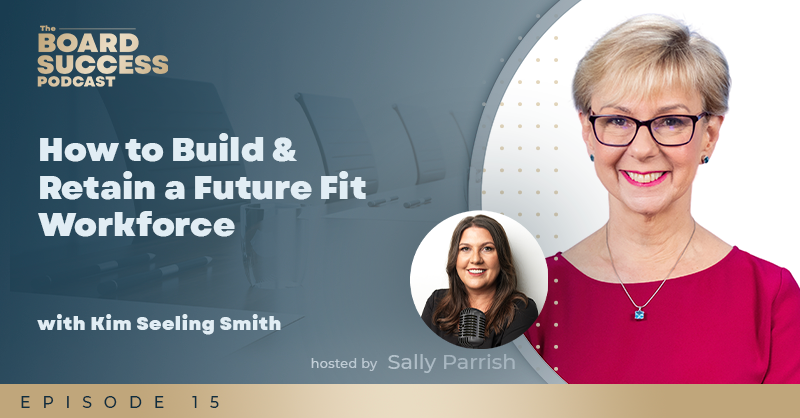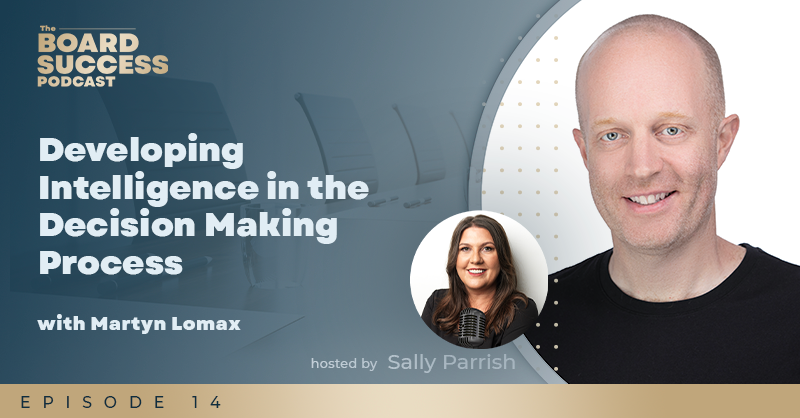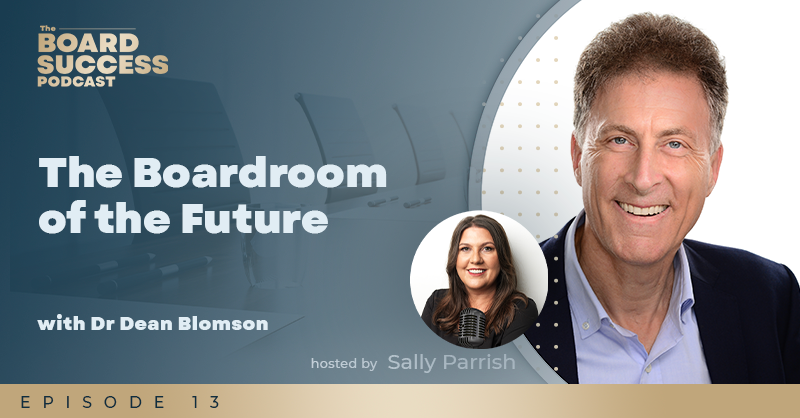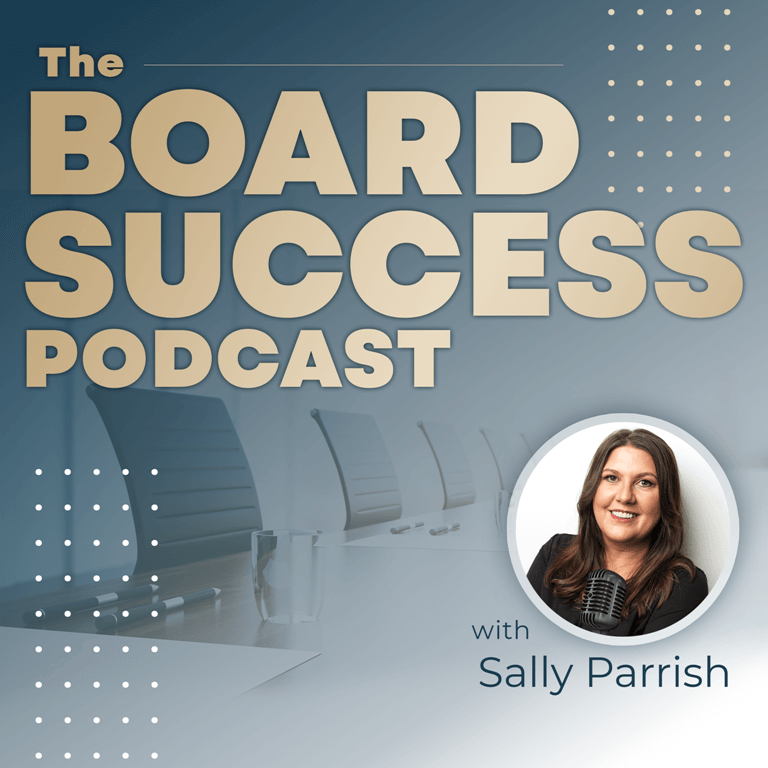The Gender Penalty with Anneli Blundell
Sally Parrish interviews Anneli Blundell
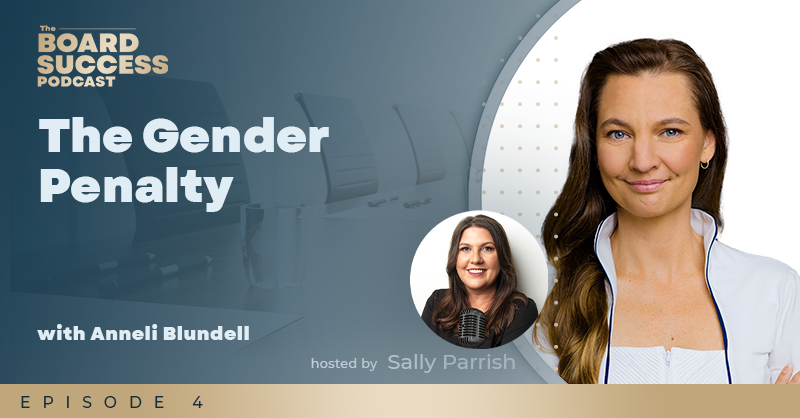
In this episode Anneli Blundell, author of The Gender Penalty joins us to discuss key concepts from the book. Anneli says that the game of work was created by men for men and that women need to understand the rules and how to play by them if they want to get ahead.
There are 5 key penalties that make it harder for women to compete on equal terms; their confidence in themselves, their communication style, their reluctance to boast about their achievements, their struggle to appear strong (without seeming bossy or aggressive) and the demands of motherhood. There's no two ways about it, women have it harder. Anneli's work goes a long way in helping men and women understand and fix the gap.
FURTHER INFORMATION
Meet Anneli on Linkedin https://au.linkedin.com/in/anneliblundell
Meet Anneli on Twitter @AnneliBlundell
Check out other Resources from Anneli Blundell including details on how to purchase 'The Gender Penalty' and 'When Men Lead Women' click here to visit www.anneliblundell.com
Click Here to View the Podcast Interview Transcript with Anneli Blundell
Sally Parrish 00:00
and executive coach Anneli Blundell. She's an award winning expert and communication and human behaviour and equity advocate and a part time Jigsaw puzzler. As some of our clients refer to her as the people whisperer. And she truly has a knack for holding up the mirror and helping people to see their true selves. She's got a fabulous body of work that she has been building and developing over the last 20 years or so. Today, we're here to talk about her fifth publication, the gender penalty, welcome analysts Great to have you on the show today.
Anneli Blundell
Hey, Sally, always a pleasure to get to chat with you.
Sally Parrish
So my first question is the gender penalty, the book, how did it come about? And what is it about?
Anneli Blundell 00:51
Well, I've been running Women at Work programs for the last six or so years. And you know, I started my business over 17 years ago. But more recently, the interest and attention in gender equity, as you would appreciate, has really catapulted this to the forefront. And so in running the women at work programs, and also doing executive coaching with both men and women, I've become really present to the issues that women are facing in their career journeys. And, you know, interestingly, I was never a
Anneli Blundell 01:27
feminist, and advocate, I didn't think women needed help. To be honest, you know, when I first started my coaching journey, people would say, What do you want to specialize in? And I'd say, I don't know, just anyone who breathes I guess, and, and other people would say, I want to coach women, I want to empower women. And I thought, Why? Why do women need all this help, I didn't understand. I didn't appreciate the inequity or the barriers as a young woman in the workforce at the time. And it wasn't until I got further along in my career, and I started supporting women in their careers, that I started to really see the invisible obstacles that women faced, even if they thought the playing field was even, even if they thought they were in charge of their own careers, there were still things that we've inherited from systems in the past that make it more difficult for women to succeed in the general corporate landscape. So you know, I looked at the literature out there, and I realized there were two schools of thought, at the time. And that was books, publications, programs, to support the development of women, ie, rah, rah, Come on, ladies, you can do it, here's how to build confidence, here's how to be a better leader, here's how to be better. And the other camp was stop focusing on women stop fixing women, there's nothing wrong with women, we need to start addressing the system. And this is where we get matches for justice and things like that. And legislation where we're trying to change the social structures that keep women in minority spaces. And so when I looked at these two, I support both I'm having daily conversations with women that say, I don't feel like I'm in the right place. I'm being overlooked. I'm being ignored. I'm being cut off in conversations in in meetings, I'm having my ideas, you know, stolen, and so women need help in the moment, but they also need help to change the game in the long term. And so this book is an homage Sally, it is an homage to both of those lenses. And I use the metaphor of the game to help explain what's going on work is a game built by men for men from yonder year, when women weren't involved in the plane, you know, they were supposed to be at home, they were at home. And so all the structures and the systems and the cultural understanding around how to win the game of work, come from an era when women weren't on the field. And women typically play the game of work like they're in a classroom and I use this sporting analogy, sorry, this analogy, that they are in the classroom, and they they do good work, they work hard, they do their homework. And when they do a good job, they automatically get bumped up to the next level. That's how classrooms work. It's not about who you know, it's not about political game playing. You don't have to put your hand up and say pick me. You just do good work. But we know that good work and being good at your job is not enough when it comes to success in the workplace, particularly as a minority as a minority. Men, on the other hand, see work as a sporting game. They're on the sports field. You know, it's about being picked by the coach.
Anneli Blundell 05:00
Watch, it's about being seen to be the best player. It's about playing full out, you know, getting dirty wrestling hard. And then it's cheers beers after the game, and everything is back to normal the next day. So we have to understand that women don't need help to be better leaders, they need help to navigate a leadership landscape, where the game they are playing is not the one they've been conditioned to play since childhood.
Sally Parrish 05:30
I love that analogy around the classroom. And I think, you know, those skills work so well for women early in their careers, you know, working hard excel in applying yourself doing well, it gets you noticed, right, so it starts off working for you. But then at some point in your career, it starts working against you have you found that there's a typical point in time when it no longer works.
Anneli Blundell 05:58
When women start having families or take on carer duties, either caring for elderly parents or elderly relatives, or caring for young families, they can no longer be there. 24/7 always available always ready, worker. And when you don't fit the 24/7 performance model, it's much harder to succeed visibility is is very closely linked to success. If I can't see you, I can't value you. And therefore if you're working part time, you're harder to remember how to to notice, granted, COVID was in some ways a blessing for the focus, we now put on the importance of flexible work, right. So we understand flexible work is good for humanity, it's good for everybody, we can get more done, we can have people who are more productive in their own personal preferences, ie if working from home suits you better. That's great, we're going to have the same level of productivity. But it also works wonderfully for women, or people, parents who have those caring responsibilities, because they're more able to juggle their life outside of work. Women have two jobs, make no mistake when they have families, they have two jobs. They are the CEO of the house and the children and the child wrangling and all the stuff that comes along with that. And also the housework. That is right the housework. So we're doing a lot on the home front. This is what the research suggests. But we're also trying to lead full time Korea lives at the same time.
Sally Parrish 07:36
Yeah, I've got a couple of comments on that. Like as, as a woman in business myself, even if you split, all of the household chores, the child raising chores, if you split them 5050, there is still a huge amount of thinking and planning and organizing that goes on before the execution of those things. So even if we split the chores, I'm still thinking about well, it's that kid's birthday in six weeks time. And we you know, we've got relatives coming on that date. So I still have that burden, even if the chores are divided. But I want to go back to working from home. Because I've been working from home for a long time in financial services, I had what was called a patch. And I would go and visit clients at home in the evening. So my admin was done at home from a home office. And then as a coach, I've always had an office in the dining room or a study. And I've always kind of hidden that, right. So I've hidden behind a glitzy Melbourne 3000 postcode, virtual office address, and I've had a telephone answering service to kind of masquerade as though I am at work so that I can feel EAC I don't know if you've experienced that before COVID You have to kind of pretend that you're not really working from home because working from home used to kind of mean that you would do in the washing and not really working. Right. Yeah. And the irony is what we what's come to light from the business case that is now proven. I mean, it's unequivocal that we are productive. We are not watching Netflix, we are,
Anneli Blundell 09:26
you know, so short, you might throw in a load of washing great. I mean, you are going to have you know, your tea breaks and lunchtimes and whatnot. And that this just seems to make sense to me. But other than that, we know that one of the big fears that people had during COVID When they worked from home was that they thought their bosses thought they weren't working so they were working harder people will be switching off. You know, your your work is there. As soon as you get up and it's there as soon as you well never leave. It's always there. And so people worked way harder before to sort of prove said it was crazy.
Sally Parrish 10:02
Yeah, absolutely not. The reason that I really wanted to get you on this board put this sports success podcast was around why this topic is so important in the boardroom, I, it's easy to think that this is a woman's problem. It's easy to think that this is an organization's problem. But why is this? Why is this such a relevant topic for boards and for organizations as a whole?
Anneli Blundell 10:32
Well, we need to tackle it from a number of different levels, if you like. So sure, at one level, it's important for women, right, as a minority group, who is on the receiving end of these invisible obstacles, or biases, or barriers, or whatever, of course, it's important to you as a woman, yes. So if you are a woman on the board, this will be important to you understanding these penalties, educating yourself around with these sorts of books and resources to know how to navigate a landscape that wasn't set up for your success. So that's the obvious level. But the conversations around boards, it's the next level is if you are a board member, you are in charge of the culture, the health, the productivity, the result of an organization. So you need to be across the fact that this is going on in your organization. We've had some lots of conversations recently, we know the government is paying a lot of attention to this here in Australia, we've had legislation around being more transparent around things like gender pay gap. So it is coming, it is coming to the forefront quicker than ever, and it's requiring boards to not only understand the issues, but just not just be aware of them, not just be in agreement that we need to be doing something but to be taking action. And I mean, structural action, one level is yes. How do we support the women? I run Women at Work programs, you know, there are no there is an appetite for investment in how to support women to be to help themselves to navigate this landscape, as I mentioned before, but there's also investment that needs to be made around inclusive leadership around how do I act as a leader in in, in increasing my level of awareness around these structural inequities. So for example, at an individual leader level, so it's not about you know, men, women, it's about how do I value all voices, I would say, simple things you can do with things like if you're running a meeting, you make sure that every voice is heard. So one of the issues that women face, and you could be thinking about this in the context of the conversations you're having at a board level, knowing this exists, you can be doing something right now, for your immediate conversations, as well as understanding what do we do with this from a intervention wide approach through the organization, but just in the conversations we have in the boardroom, knowing that women are more likely to be talked over ignored or interrupted when they speak that we need to add simple things like a structural change that says, we hear from everyone before we make a decision, right? Maybe you do, maybe you don't. But if you don't, it's the simplest thing to to pick up. And it will ensure that everyone's voices are valued equally. The next thing is so just so it's the women's aspect, it's your personal leadership aspect. But it's also your responsibility as the board not just from a legislative approach, and make no mistake, that legislation is only going to increase, I wouldn't be surprised if we've got targets coming in, and a lot more accountability as a director in how we are approaching the DEI space, particularly when it comes to women. So there's going to be legal requirements around this. But all of that is a strategic level of thinking where I come from, is the interpersonal space. Because for me, it doesn't matter what you believe. I know you believe in equality, I know you believe that everyone should be valued equally, and we all have access to equal opportunity. But it's more important to me to ask yourself, How am I behaving? Am I making space for that voice that doesn't seem to get a word in? Am I amplifying the voice of an of a minority who keeps getting cut off and interrupted? am I noticing that that other person never gets a word in? Or when they do they get interrupted and nobody comes back to them? Am I an ally in that moment?
Sally Parrish 14:49
Yeah, I love that. And it's, it's how can I? How can I understand the rules and play by them? How can people understand that these different rules exists and how to make that fair for everyone. And what can we as boards do in an organization to ensure that we're creating opportunities for equality, I just want to go through some of the key concepts in your work. So first of all, let's talk about equality, and equity. Because, you know, sometimes those words are used interchangeably, right? But they are different things. So how would you define equality? And how would you define equity?
Anneli Blundell 15:33
So for me, equality is the aim. It's where we're headed. So the goal is equal opportunity or equal access to opportunities and resources. Yep. So everyone can go for this job. Yeah, yeah. So you do not get excluded from applying for this job because you're a woman, etc. So access to equal opportunities and resources, equity is around giving unequal support, ie maybe some more support to those who need more support. So they are better situated to access those opportunities. So for example, anyone male or female, anyone in between anyone on the spectrum can apply for this role. But if I say we need 10 years experience, for you to be able to apply for this role, but we want, we want equal opportunity for everybody. But you've never had women in that role in this organization ever. So no woman has ever been able to get 10 years experience. Yeah, yeah. I'm never gonna get access to that. Yes. Even though you say everyone's invited, but you're never going to pick me because I can't demonstrate that background
Sally Parrish 16:53
can't meet the criteria, or you have a really great analogy that not only explains the difference between equality and equity, but it helps people who don't really understand whether equity is there or not use a shopping analogy, right?
Anneli Blundell 17:11
Yeah, well, what I found was that I was having lots of conversations with men around that they were quiet, selling quiet code, or private conversations, asking me questions like, you know, I believe in women, I believe in equality, I want to be an ally. But just between you and me, Emily, I'm not sure I really understand the problem. You know, I sit with my colleague, we went to the same universities same degree, we've got access to the same jobs. And if I get the job, and she doesn't, like, I don't understand how that's a problem. And so and I can't ask this question of her or anyone in the workplace without feeling like, I'm going to be accused of being sexist or not being a supporter. So I'm grappling with really getting an understanding as to what are the impacts when I as a man, I'm not experiencing those impacts. And I don't know how to ask for it. And I say, men, when men are not bad, this is not men against women. It cannot be men against women. It has to be all of us as a society against the structures we've inherited. But one way to make it easy for people to understand and to really liberate men from this potential guilt around. Sometimes I don't think it's as bad as people are talking about and I'm not sure what I'm not seeing point of view. I liken it to the idea of going shopping. So we've got a tall shopper and a short shopper, and they both go to the supermarket. They both have $100 to spend, that is equal opportunity. They have $100 to spend the tool shopper walks up and down the aisles grabbing anything they want from any shelf because they can reach all the shelves. They go in, they go out they've spent their money. The short shopper goes into the shop, and they can't reach the top shelves, right? Equity. This is an equity issue. I'm allowed to shop from the top but I just can't reach it. So I need more help. So I encounter invisible obstacles as part of this exercise. That means I either have to take an inferior product to take a more expensive product down on the lower shelves. I have to wait and get someone who walks past with long limbs to help me get it out. So I've experienced obstacles that the tall shopper is not really you know present to because why would they be there tool they don't even know
Sally Parrish 19:34
Yeah, wouldn't even know. Yeah,
Anneli Blundell 19:37
I talk about men having a blinkered experience just like a tour shopper has a blinkered experience, they walk out of the supermarket. You look across at my shopping center, my shopping basket because I may or may not be five foot two of nothing. So I have this experience. And you look across at my basket and go we have the same goods. We spent the same amount of money. Where's the inequity? I can't see it. And I go I Of course you can't. It's not until you as the toll shopper, take your Aunt Betty or your Uncle Joe, you know, reach the top shelf and you think, oh, gosh, what the? I'm here to help you.
Sally Parrish 20:13
Yes, yes, you wouldn't be aware of it. So I love that analogy, because that really helps us understand because I think I think we've talked about equality for a very, very long time. And I think we feel like we're moving towards equality. But equity is the mechanism to get us all there, right? It's the steps that we need so that we can achieve that. So what we're asking for is for businesses to be more aware in the equity stakes, what do they need to put in place to ensure that everyone has access to those equal opportunities that they are supposedly providing? And I think we, you know, we've done some really, really great work in this space. But I feel like there's a lot to be done, and I and I think every time we put an equity step in place, it kind of hinders those that didn't need the equity step. So if we look at the composition of male and females in the boardroom, we know that there are far too many boards that are male only, we know that there are a disproportionate amount of females to males that non executive director level. And we bought in quoters, and we said okay, so we've got to have one female on every board. And for one, that doesn't help the female that lands the row who believes that she's there, because they needed a female rather than they took her on for her skills. So, you know, sometimes that can lead to a confidence issue. Sometimes that can lead to disrespect from her peers who think that she's there, because she's the woman, we've seen CEOs that, you know, where we've had female targets, and we've put female CEO in and it's our she's just there because she's a woman, and that woman then doesn't get the respect of the organization ultimately fails in her role. And that proves the point that women aren't good CEOs, right. So sometimes it can perpetuate some of this inadequacy and equity. But we have seen quotas and like, the more loaves them, they can go against the males, right. So I have male clients that find it harder now to get on to a board. Because they feel like they're, you know, they're of a certain age, a certain color, and that they'll be disregarded now, because they're not female. So I think we have to be really careful. What I love about your work is how you've how you've identified five key areas, five key concepts of gender penalties. And I think this is a really great framework for anyone who's trying to understand so that they can do better in this space. What are the five key gender penalties that you've identified in the book?
Anneli Blundell 23:03
Before we jump to that, Sally, I just can't let your last comment go without adding adding my own pain. It was it was just Sure. It's just too juicy. So because I really think the listeners will have this front of mind, because it's not only your clients who are talking to you about this idea of a men going to be disadvantaged. That's really what we're talking about. Yeah, yeah. And I think it's a really juicy conversation. And I'd love to add some fodder for our thinking around this. So for the women, I would say, if you feel like your agenda, a coder appointment, like literally, if you feel like you just there because you're a female, and you're ticking that box,
Sally Parrish 23:46
so they call that the token appointment.
Anneli Blundell 23:49
You are the token appointment, whatever level you're the token appointment, I say, don't take the job. Unless you know you can do it. And if you know you can do it, just go ahead and do a damn good job. Because if you prove yourself and do the good job that tokenism will just fade away it won't. Or after a while, right? If you are a token appointment, and you don't think you can do the job, don't take the job, because that is all sorts of drama. So don't do it. Yeah, that's that's for the females. For the men. This one's really tough Sally. You know, let's let's call it as it is. It's really tough. It is why I address it in this pocket book when men lead women. I talk about the idea of does more opportunity for women men less opportunity for me as a man. And the answer is yes. And no. Let's be really frank about this. And it really depends on how you look at it. It depends on what opportunities other opportunities you feel you have access to. So if you look at it, just from a black and white perspective, if you We're going to go for a role as a, you know, middle aged white man, let's say this is this is now the group that is feeling more disadvantaged. And I understand why, if you in the past would have gone for a role and you know, you would have been likely to get it. And now you're not even putting your hat in the ring, because they are literally asking for a female. So you know, you won't even get accepted. Your reality is yes, it is a zero sum game and you've lost, right, there's no denying that you had it. Now, you're not going to get it, I get that. However, it if you leave it at that, it is always going to feel like an injustice, right? And we know that this is going to be a reality for a lot of men. And we will, we will need to address this. So we can look at it as an injustice. Or we can look at it as an opportunity. You might go Alright, this is not the path for me. What else can I be doing? Maybe it's time for me to become a mentor to people on boards. Maybe you know what I've always wanted to start my own blah, blah business, maybe that's time for you to do that now. But men are going to have to start thinking outside the box because their linear. Previous career trajectory is no longer as certain as it once was. Now, let's investigate that for a minute. That is exactly how it's been for women. So what if we really think about this? And I want to get clear, if you feel like you don't have access to that job that you always had access to? Women have never had access to that job. Yeah, well, at least they didn't have enough experience, they will always they were overlooked for that. So they have felt for hundreds of years, how you now feel in this one moment, ie, I'm not going to get it because I'm a man, women have been saying I'm not going to get it because I'm a woman for hundreds of years. Yeah, all that's happened now is you are not less. entitled, you're not getting, what's the word, you're not missing out more, you are experiencing greater competition, you only competed against men like you in the past. Because that's that's who got those roles. And now we're saying we need to make space for women as well. And actually, for it for an instance of time, not forever. This is where we hit equity. Now, for an instance of time, we need to let more females through. If we truly want diversity of thinking and experience and background because we need men and women both. And right now the only way to balance that out is to actually proactively get more women in so that we can start from an even playing ground. Because we know that if we just we if we let it take care of itself. We know this from countries like Norway that if we just say we just ask people to put more women on and to be more balanced, it doesn't naturally happen without the push of targets or quotas or some extra mechanism to some positive discrimination to shift the balance. Now this is going to be hard to hear. I get that it's going to be hard to take for some men because again, the reality for them is that's all good. Annalee but I don't get that job. And I say yes. Yes. And I'm sorry that that will be the reality for some of you. And and that has been the reality for women for hundreds of years.
Sally Parrish 28:29
Yeah, I say that. Not that they can't. Not that men can't get seats on boards anymore, it's that they've lost that automatic entitlement. And they now need to compete for those seats like women always have had to write. So I feel like there is equality and equity coming. I think we're probably 20 or 30 years away from it. In all honesty, I don't think this is something that's going to happen really quickly. But as we see more women on boards, and those, we've already seen statistics to show that there's impact on the bottom line when there's diversity on board. So we know that it works, we know that it creates value. It's about getting that balance, right so that we're not appointing women for the sake of appointing them. Like if you can't find a great female candidate for the role. I say appoint a man as long as you did look for a female candidate, you know, by all means, appoint them out, you've got to do the best job for the organization. And for that point, Sally,
Anneli Blundell 29:34
I've got organizations that I work with that are really committed to gender equality. And they do exactly that. Like I've had CEOs say I want a female in this role. We really need to start getting serious about this. I want a female in this role. They've waited a year, a year without
Sally Parrish 29:51
me I can't find them.
Anneli Blundell 29:53
And they cannot find them and so they will appoint a man and so this is it's not to say that, you know, they're just getting the second This because they'll just take, yeah, you can play this from any side of the card. But what we're saying here is, you have hand on heart, really put in an effort, like you've really, really put in an effort. And this one, it didn't work out, but it's not from lack of serious commitment to.
Sally Parrish 30:20
And that's not to say either that there aren't great women for those roles. It's just that you can't find the right fit for that opportunity that you've got. Let's talk about those five key concepts, the five gender to fall with my finger then five, gender penalties, what are they?
Anneli Blundell 30:41
So the penalties are the invisible obstacles that women face, in their career trajectory in the game of work. So it's often things that women are given as career advice, the things that they need to do to be seen as leaders and to be able to advance in their careers. But when women try and do it, they get hit with a penalty, because what's happening is to be seen as a leader, is different to be seeing as a lady. And there's two roles that we play in life as women, we have to fit the gender box. So we have to be lady like nurturing, supportive, supportive, helpful, humble, caring, or that that's that's our feminine stereotype. But to be seen, as a leader, you need to be bold, and strong and decisive and authoritative and all these other characteristics which go against the the female gender stereotype. So the conundrum for women is you're either seen as leader like, but you're violating the gender norms as being a female, or you're seen as a female, but you're violating the norms of being seen as a leader. So for women to to get ahead in their careers, they need to know how to navigate the double binds through that come about through these penalties. So the five penalties that I cover in the book are confidence. So women are told they need to display more confidence than two and a half times more likely to be given that feedback. And the issue here is women are socialized to be humble, they're socialized to be modest. We don't like women being overly confident when women are too confident. They're labeled as arrogant. So that's the backlash that if we you know, move outside of our gender norm and try and take up what's required in the leader norm of being confident, that's where we get the backlash. Communication is the second penalty. So women are conditioned to, to communicate in ways that are amenable are community based, elevate others, we have ways of connecting that we want to support other people in conversation, we want to make time and space for people when they speak. So women make space. Men are socialized to take the space to take the spotlight, to elevate themselves to expect ritual debate and opposition. And so the way we're conditioned to communicate, women tend to take a step back, and men tend to take a step forward. And all of a sudden, we're two steps apart. And men end up dominating the conversation most of the time. So women report being talked over, interrupted, ignored all that sort of stuff. The third penalty is around boasting. And this is that women need to self promote, you need to showcase you need to speak about your strengths, or no one will know what you do annually. You need to tell people what you're great at. Shoot me now no one wants to boast. And I say this is also for most people in Australia, culturally taboo to be a tall poppy in this country, but especially so for women. So women we do not want to self promote. We do not want to brag but the conundrum for us then the double bind is that we remain invisible. The fourth penalty is around strength. We're told if we want to be seen as leaders that we need to be assertive, we need to be strong, we need to be decisive and bold. But we get then labeled as aggressive, as difficult as a pitch a ballbreaker. Right. So the same action that a man takes if a woman takes it she gets seen in a negative light. This means that women don't say no as much. They're not pushing back as much. They're lumped with what we call the office housework women are 40% more likely to be given or volunteered the office housework, you know, the birthday cards, the meeting notes, the minutes the coffees off site lunches, all that sort of stuff. And the final penalty is around motherhood. So when women start families, they're seen as less committed. When men have families they're seen as more responsible. Now they're their provider. Now they're the breadwinner. They have to be responsible because they're providers, whereas women seem like They're flaky, they're less committed, they're gonna commit to their family, they're not as serious about their career, because now they are a mother. And it is heartbreaking because I can't tell you how hard mothers work to stay top of mind to be seen as future contributors in an organization because they know the value that they're sitting on. But they know it's a moment in time that they can't be as available as they want to be. But it does not mean they are any less capable.
Sally Parrish 35:29
And they can't win because they're at work and feeling guilty that they're not at home, and they're at home and feeling guilty because they're not at work, right, they just can't win. I love I love those five, because to me, that really starts helping us understand as a society, why there aren't more women on boards. And it's not because there aren't enough opportunities out there. It's because of what it takes to win a board appointment. And that is one, you've got to have the confidence. And we know that women will seek assurance that they can do a role before they'll apply for it, whereas men will give it a go. So women are very reluctant to just throw their hat in the ring just apply, you know, just see what happens. And we often find that, you know, if I interview male, non executive directors and ask them, How did you get your boyfriend? Well, it's kind of funny because I was and it kind of happened, right? Whereas for women, they've got to be absolutely sure and certain that they're not making a fool of themselves by applying for the role. The second thing is they've really got to toot their horn. And I can't express strongly enough, how loudly they got to toot that horn to cut across all that noise out there, right, you have to be really boastful about what you've done in your executive career to showcase the potential that you have at board level. So a lot of these things don't come naturally for women. And that's a lot of the work that I do with my clients, I work with males and I work with females. And the work I do with males is really showing them that they've got to compete more to win these roles. And the work I do with females is showing them that they've got to compete more to win these roles, right. But how they compete. It's very, very difference. I think that those penalties that you talk about there, I think they'll be quite revealing. I think we've talked about that motherhood gap for many, many years, we've never called it a gender penalty as such, but we've always, always known that it's it's difficult, it's difficult to be a mom and a leader at the same time. It's difficult to be in two places at the same time. I love that. But I was gonna say can we just we've got a few minutes left. But I really want to hone in hone in on that communications piece. Because this I think is really important in the boardroom to understand how females communicate and how mouths communicate. So whether that's into board relations, or whether it's the exec team presenting to the board, what are the different styles or stylistics of those communications?
Anneli Blundell 38:16
So we know that the way we are conditioned to communicate right from the get go like right from early childhood is different for men or women or boys and girls, as it were. So girls are conditioned to play nice to be nice to be amenable, to share the spotlight to elevate others, you'll see this ritual happen all the time, Sally, if someone says to a woman, Oh, I love your dress. Oh, this old thing? Oh, you know, it's old. I was in the back of a cupboard. It's no big deal. But I love your blouse. You look amazing. It's as soon as the spotlight comes to me, I want to shine it right back on you. And you right that is that we all know this. This is the role of women interacting one on one. That is how you play the game as a female. And whereas what's part of the conditioning? Also, is this ritualized need to apologize. I'm sorry, can I just ask a question? Sorry, can I interrupt you for a moment? Sorry, I'm not sure I really understand what point you're trying to make. And it's this idea of we want to save face for other people. We want to be accommodating and it's really important to us that we elevate others that we are not elevating ourselves over others. Men on the other hand, conditioned as boys from early on to take center stage to take the spotlight like it's who can tell the funniest joke who can do the most daring D who can you know, who can win over all the other boys and and who's the leader and who's the top dog so it's his competitive ritualization and they should have boys and it comes out in The communication who's the funniest, who's the loudest who's the quickest? Who can be the most daring and bold, and it comes out in ritualized opposition. So a guy will feel free to throw out 10 ideas, and none of them are absolutely ridiculous and way out there, but one might be amazing. But he understands it's part of the game, you chuck all the ridiculous ideas out there a new way and expect for your colleagues to go, Oh, Bob, really that, oh, that's not gonna work, you know, that's not gonna work. Don't be so ridiculous. And you have a bit of a laugh, and you wrestle a little bit more. And you know, that's part and parcel of the game. Women don't understand that game. I have women tell me all the time, I have to wait, I have to be perfect, I have to be really prepared, I have to know that this is going to be a really great idea. Because it when I send it out there, they're going to ask me questions about it, they're going to, you know, ask me to explain or they're going to come back at me and I'm going to feel like an idiot. And I say that's part of the game, it's part of the game, your job is to also throw them back and wrestle with the ideas and know you are going to be challenged. Now, something assigned to that. We also know that women are challenged more than men are. So men expect ritualized debate, we want to wrestle with the ideas, we expect opposition, but women are also asked to defend, justify and explain more than men. So there is a sense that women aren't believed they have to work that they do have to work harder, they do have to prove themselves more, a lot of the time. So you know, there's a little bit of that, that knocks their confidence is a little bit of the not recognizing the game antics of how to be in the conversation. And again, taking that personally, where men don't operate like that. There's also this idea that we know women have a tendency to be interrupted, more spoken over, ignored more. So in mixed communication settings, men have a tendency to dominate conversations 75% of the time. So if women are socialized to make space, men are socialized to take space, it takes extra effort for women to feel confident to put their idea on the table to put their idea on the table to hold their ideal firm on the table to claim the idea when it gets stolen and re appropriated by somebody else two or three times and still not come back to them with the correct appropriation. So there's barrier barrier barrier barrier, even for women that I coach and work with that are really confident, and they're no nonsense players, and they don't have any issues with you know, wanting to be perfect. They're like, I know what I want to say, I want to say it and I'm in there all the time. And I still get obstacles where one of my clients has an example. And this is an example I've got in the book. She was on a board. She's been a board member for a long time and absolutely incredible operator. She says just the other week, I was having conversation with the board. And I said in very clear terms, what we need to be focusing on for the next year, these three things a 123, she listed them out just three words like opportunities, advancement and equity, whatever they were. And they weren't, um, there was nothing. The very next guy to speak said I move motion that the first the next two things we need to work on this year, our 123 and restated her ideas. And she looked at him waiting for the as stated,
Sally Parrish 43:29
you know, by acknowledgement.
Anneli Blundell 43:30
I would normally make this an announcement. I just like to formalize it. He didn't look at her. He didn't acknowledge her. He didn't say anything about the fact that it was her idea. Then it was seconded by a second man, seconded by a third man, still none of them looking at her. And they said, Okay, motion moved. Now, she said, that's fine. I mean, they great. I'm glad they support my ideas. That's great. It's in the minutes. But it's in the minutes as his idea. It's in the minutes that this was come up by him, no acknowledgement to her. And this is a pattern of behavior that happens all the time. And she said there was no acknowledgement of where that came from conversation with the chairperson afterwards and said, This is not okay. Why didn't us step in? I can say to I'm blue in the face. Hey, that was my idea. But why are we leaving it to the women? Why are we leaving it to the minority groups to keep advocating for themselves when it's a structural issue that's come from our societal conditioning that says, hey, leaders have a responsibility here. Every single person Who seconded that had an opportunity to say, oh, as originally stated by but didn't, the chairperson had an opportunity to say, Hey, okay, that's good. Now let's put the acknowledgement here. And let's make sure we don't do this in future because this happens to be a pattern of how we go about and socialize ideas. So many opportunities to break We need to challenge that, you know, behavior that were missed.
Sally Parrish 45:04
What a great example. And unfortunately not an example in isolation. There are many, many, many examples in this fabulous book, the gender penalty, just before I'm just gonna give a quick plug for that. But before I do, you spoke about another pocket book guide the when men lead women, what's that book?
Anneli Blundell 45:25
When men lead women, I'm glad you are selling. Um, here's one I prepared earlier. Well, this book came about, actually, in the middle of writing the gender penalty, I stopped. And I wrote this pocket book, it just takes an hour to read, it's really quite quick. And I did it because I'm running lots of programs for women at work. I'm talking with leaders of the women in the program managers, executives sponsoring the program. So a lot of men involved in this program, because remember, it's not, we're not fixing women here, we're fixing a societal problem. We require all hands on deck for this. So as much as we're equipping women to navigate the uneven landscape, we need to educate men around what that landscape is. Remember, tall shopper, short shopper. So as part of those conversations, I realized I was getting asked a lot about what's really going on. I'm not sure I really understand this. And so I wrote this book with a goal to answer the key questions that men were worried about concerned about trying to navigate as a male leader in this new equality landscape, when they didn't feel it was safe to ask, you know, without looking like they weren't supportive, they weren't allies, or they were just downright sexist. I absolutely
Sally Parrish 46:44
love it. So when men lead women, and the gender penalty available on Amazon and on Anneliese website, Emily blundell.com Ally has been absolutely fascinating. I hope you come back later in the series and talk to us more about influence in the boardroom because I feel like we could talk about this for hours and hours. Thanks for joining us today.
Anneli Blundell 47:06
Yes, I look forward to it. Thanks, Sally.
Explore more episodes
